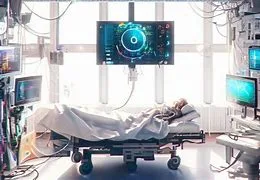Inside the ICU: How Real-Time AI Monitoring Is Saving Lives
In the silent hum of hospital ICUs, where every heartbeat matters, a new guardian watches over patients — Artificial Intelligence. What once seemed futuristic is now a life-saving reality, silently analyzing patient data, predicting complications, and helping healthcare professionals make critical decisions in seconds.
🔬 The AI Revolution in ICUs
Modern ICUs are data-heavy. Every patient is connected to monitors tracking vitals like heart rate, oxygen levels, and respiratory function. Real-time AI systems analyze this constant flow of information, spotting patterns and warning signs even before a human doctor could.
For instance, AI can detect early signs of sepsis, a potentially fatal condition, hours before it manifests in traditional testing. That early detection? It can mean the difference between life and death.
💡 How It Works
-
Data Collection: Continuous input from bedside monitors
-
Machine Learning Models: Trained on millions of ICU cases
-
Prediction & Alert: Early warnings for organ failure, cardiac arrest, and infection
-
Decision Support: Suggests treatment adjustments based on patient response
👩⚕️ Real Impact on Patient Outcomes
Hospitals like Mayo Clinic and Apollo Hospitals in India are piloting AI-based ICU monitoring. Results show up to 30% reduction in preventable ICU deaths and quicker recovery times due to timely interventions.
💬 Expert Insight
"AI doesn’t replace doctors—it empowers them. It offers a second pair of eyes that never sleep."
— Dr. Meera Kaushik, Chief of Critical Care
🧠 Role in Medical Scribing
Medical scribes are now trained not just in documentation but in interpreting AI outputs, coding alerts, and updating EMRs with real-time recommendations, creating a new hybrid healthcare workforce.
🌍 The Future is Now
As the cost of deploying AI reduces and accessibility improves, AI-assisted ICUs will become the global standard. It’s not just about innovation—it’s about saving lives, faster and smarter.
📣 Final Thoughts
AI in ICUs is no longer science fiction—it’s our present. As healthcare continues to embrace technology, being informed and trained in such cutting-edge tools is essential for every medical scribe, healthcare worker, and policy maker.
👉 Stay ahead. Learn. Adapt. Save lives.

Comments
Post a Comment